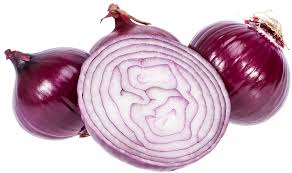CEBOLLA
Most onion cultivars are about 89% water, 9% carbohydrates (including 4% sugar and 2% dietary fibre), 1% protein, and negligible fat (table). Onions contain low amounts of essential nutrients and have an energy value of 166 kJ (40 Calories) in a 100 g (3.5 oz) amount. Onions contribute savoury flavour to dishes without contributing significant caloric content.[20]
| Nutritional value per 100 g (3.5 oz) | |
|---|---|
| Energy | 166 kJ (40 kcal) |
|
9.34 g
|
|
| Sugars | 4.24 g |
| Dietary fibre | 1.7 g |
|
0.1 g
|
|
|
1.1 g
|
|
| Vitamins | Quantity
%DV†
|
| Thiamine (B1) |
4%
0.046 mg |
| Riboflavin (B2) |
2%
0.027 mg |
| Niacin (B3) |
1%
0.116 mg |
| Pantothenic acid (B5) |
2%
0.123 mg |
| Vitamin B6 |
9%
0.12 mg |
| Folate (B9) |
5%
19 μg |
| Vitamin C |
9%
7.4 mg |
| Minerals | Quantity
%DV†
|
| Calcium |
2%
23 mg |
| Iron |
2%
0.21 mg |
| Magnesium |
3%
10 mg |
| Manganese |
6%
0.129 mg |
| Phosphorus |
4%
29 mg |
| Potassium |
3%
146 mg |
| Zinc |
2%
0.17 mg |
| Other constituents | Quantity |
| Water | 89.11 g |
| Fluoride | 1.1 µg |
|
| |







Comentarios
Publicar un comentario